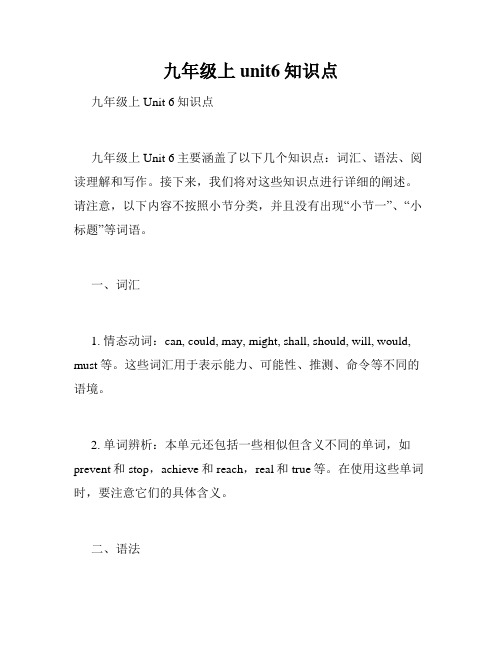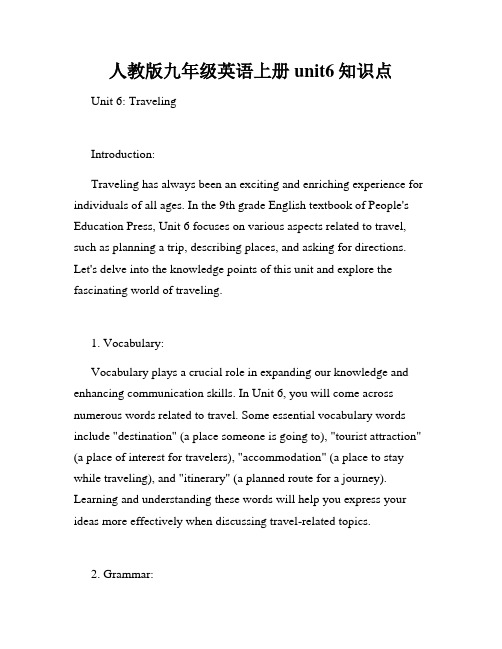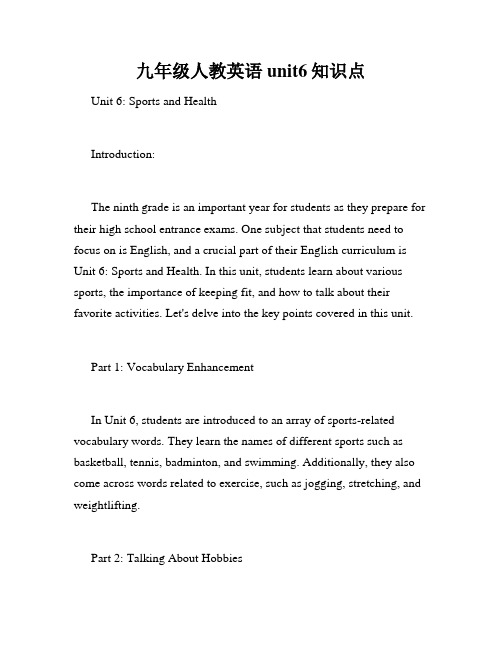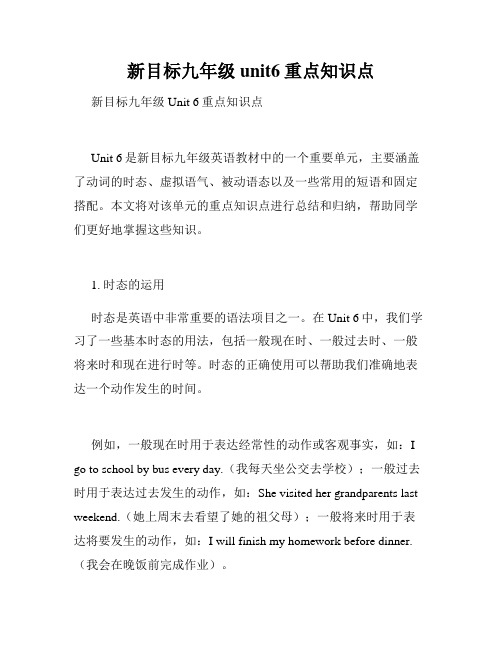初三上册英语第六单元知识点:unit6
人教版九年级上册英语unit6知识点

人教版九年级上册英语unit6知识点九年级上册英语Unit6知识点回顾在九年级上册英语中,Unit6是一个重要的单元,主要涉及到时间的表达和询问,并且包括几个重要的语法结构。
本文将对这些知识点进行回顾,并探讨如何运用这些知识点来提高英语水平。
1. 时间的表达在Unit6中,我们学习了几种表示时间的方法。
首先是使用基数词表示具体的日期,例如:July 1st。
另一种方法是使用序数词表示星期几,例如:Monday。
在具体的时间表达上,我们可以使用24小时制,也可以使用12小时制。
例如:9:30表示上午9点30分,而15:45表示下午3点45分。
此外,我们还学习了表示频率的表达方式,包括always、usually、often、sometimes、seldom和never等。
这些词汇可以帮助我们描述我们日常的活动和习惯。
2. 时间的询问在英语中,询问时间是一个常见的场景。
在Unit6中,我们学习了几种方式来询问时间。
最常见的方式是问"What time is it?",这是一个简单而直接的方式。
当然,我们还可以使用更为复杂的方式来询问,例如:"What's the time now?"或者"What time do you have?"。
这些方式在日常交流中也是常见的。
3. 一般现在时和现在进行时在Unit6中,我们学习了一般现在时和现在进行时两种时态。
一般现在时用于叙述客观事实和常规习惯,例如:"I go to school every day.";现在进行时则用于表示正在进行的动作,例如:"She is watching TV right now."这两种时态在日常英语中非常常见,掌握它们的用法对于提高口语表达能力至关重要。
4. 发表意见和建议在Unit6中,我们还学习了一些表达意见和建议的句子。
九年级上unit6知识点

九年级上unit6知识点九年级上Unit 6知识点九年级上Unit 6主要涵盖了以下几个知识点:词汇、语法、阅读理解和写作。
接下来,我们将对这些知识点进行详细的阐述。
请注意,以下内容不按照小节分类,并且没有出现“小节一”、“小标题”等词语。
一、词汇1. 情态动词:can, could, may, might, shall, should, will, would, must等。
这些词汇用于表示能力、可能性、推测、命令等不同的语境。
2. 单词辨析:本单元还包括一些相似但含义不同的单词,如prevent和stop,achieve和reach,real和true等。
在使用这些单词时,要注意它们的具体含义。
二、语法1. 时态:九年级上Unit 6涉及到一些重要的时态,包括一般现在时、一般过去时、一般将来时和现在进行时。
在运用这些时态时,需要注意动词的变化和句子的结构。
2. 宾语从句:本单元还介绍了宾语从句的用法。
宾语从句通常由连接词that或wh-引导,并在主句中作宾语。
例如:“He said that he was busy.”3. 条件句:条件句分为三种类型:零条件句、一般条件句和虚拟条件句。
在条件句中,要注意条件从句和主句之间的时态和语序。
三、阅读理解1. 阅读技巧:在阅读理解题中,我们需要注意细节理解、推理判断和主旨归纳等不同类型问题。
可以通过仔细阅读短文、标记关键信息和进行逻辑推理来解答问题。
2. 题型分析:九年级上Unit 6的阅读理解包括多项选择、填空和简答题等不同类型。
在回答问题时,要准确抓住问题的要点,并结合短文进行分析。
四、写作1. 书信写作:本单元包括了一篇关于自我介绍的书信写作任务。
在写作时,需要注意礼貌用语、句子的连贯性和正确的书信格式。
2. 句子连接:为了使写作更加流畅,我们需要使用适当的句子连接词,如and, but, because, however, therefore等。
九年级上册unit6知识点

九年级上册unit6知识点Unit 6 Knowledge Points for Grade 9In the ninth-grade curriculum, Unit 6 covers various knowledge points that are crucial for students to understand and master. This unit introduces new concepts, expands on previously learned topics, and provides a solid foundation for future learning. Let's explore the key points covered in Unit 6.1. Algebraic ExpressionsAlgebraic expressions are mathematical statements that include numbers, variables, and mathematical operations. Students learn to simplify expressions, combine like terms, and solve equations involving variables. This knowledge helps them solve real-life problems and lay the groundwork for more advanced algebraic concepts.2. Linear Equations and InequalitiesLinear equations involve variables raised to the power of 1 and have a constant ratio between variables. Students study methods such as the balance method and the substitution method to solve linear equations. They also learn about linear inequalities, which involveusing symbols like "<" and ">" to represent relationships between quantities.3. FunctionsFunctions are mathematical relationships that describe how two variables are related. Students explore linear and nonlinear functions, learn to read and interpret function notation, and graph functions on a coordinate plane. Understanding functions is essential for analyzing and modeling various real-life situations.4. Systems of EquationsA system of equations involves multiple equations with multiple variables. Students learn to solve systems of equations graphically, algebraically, and using matrices. This knowledge helps them tackle complex problem-solving tasks by representing multiple relationships simultaneously.5. Coordinate GeometryCoordinate geometry combines algebraic and geometric concepts. Students learn about the Cartesian coordinate system, graphing equations, finding the slope and distance between points, and solving geometric problems using coordinate geometry techniques.6. Statistical AnalysisUnit 6 introduces fundamental statistical concepts such as measures of central tendency (mean, median, mode), measures of dispersion (range, variance, standard deviation), and how to display data using histograms and box plots. These skills enable students to analyze and interpret data effectively.7. ProbabilityProbability is the study of chance and uncertainty. Students learn about the basic rules of probability, calculate probabilities of simple and compound events, and explore concepts such as mutually exclusive and independent events. Understanding probability enables students to make informed decisions based on likelihood.8. Pythagorean TheoremThe Pythagorean theorem relates to right triangles and states that the square of the hypotenuse (the side opposite the right angle) is equal to the sum of the squares of the other two sides. Students use this theorem to solve problems involving right triangles and apply it to real-world scenarios.9. Geometric TransformationsGeometric transformations involve changes in size, shape, or position of figures. Students study translations, reflections, rotations, and dilations. Understanding these concepts helps them analyze patterns, solve geometric problems, and explore symmetry and tessellations.In conclusion, Unit 6 of the ninth-grade curriculum covers a wide range of knowledge points in algebra, geometry, statistics, and probability. By understanding and mastering these concepts, students develop essential mathematical skills and problem-solving abilities that are crucial for their academic and real-life success.。
人教版九年级英语上册unit6知识点

人教版九年级英语上册unit6知识点Unit 6: TravelingIntroduction:Traveling has always been an exciting and enriching experience for individuals of all ages. In the 9th grade English textbook of People's Education Press, Unit 6 focuses on various aspects related to travel, such as planning a trip, describing places, and asking for directions. Let's delve into the knowledge points of this unit and explore the fascinating world of traveling.1. Vocabulary:Vocabulary plays a crucial role in expanding our knowledge and enhancing communication skills. In Unit 6, you will come across numerous words related to travel. Some essential vocabulary words include "destination" (a place someone is going to), "tourist attraction"(a place of interest for travelers), "accommodation" (a place to stay while traveling), and "itinerary" (a planned route for a journey). Learning and understanding these words will help you express your ideas more effectively when discussing travel-related topics.2. Grammar:Grammar forms the foundation of any language. In Unit 6, you will learn valuable grammar concepts that can assist you in building grammatically correct sentences while discussing travel experiences. For instance, you will familiarize yourself with the use of present continuous tense when talking about future travel plans. Additionally, the unit also introduces the concept of reported speech, enabling you to recount conversations or recommendations regarding travel.3. Reading Comprehension:Unit 6 consists of various reading passages that aim to improve your reading comprehension skills. These passages cover diverse topics related to travel, including hotel reviews, travel brochures, and articles about tourist destinations. By reading and understanding these passages, you will not only enhance your vocabulary but also develop your ability to grasp information from written texts.4. Speaking and Listening:Effective communication is a vital component of any travel experience. Unit 6 provides ample opportunities to improve your speaking and listening skills. Through dialogues and group activities, you will learn how to ask for directions, describe places, and talk about travel experiences. These activities encourage teamwork and foster an interactive learning environment.5. Writing:Unit 6 also focuses on developing your writing skills. You will learn different writing formats, such as brochures and postcards, enabling you to effectively convey information about travel destinations. Additionally, you will practice writing travel itineraries, allowing you to plan and organize your own trips. These writing exercises aim to sharpen your composition skills and enhance your ability to convey information concisely.Conclusion:Unit 6 of the 9th-grade English textbook provides a comprehensive understanding of travel-related topics. By delving into vocabulary, grammar, reading comprehension, speaking, listening, and writing exercises, you can develop crucial language skills necessary for expressing your ideas and experiences related to travel. Remember, the knowledge gained from this unit is not limited to the classroom but can be applied to real-life situations, enriching your future travel experiences. So, gear up and embark on an exciting linguistic journey in the world of travel!。
九年级人教英语unit6知识点

九年级人教英语unit6知识点Unit 6: Sports and HealthIntroduction:The ninth grade is an important year for students as they prepare for their high school entrance exams. One subject that students need to focus on is English, and a crucial part of their English curriculum is Unit 6: Sports and Health. In this unit, students learn about various sports, the importance of keeping fit, and how to talk about their favorite activities. Let's delve into the key points covered in this unit.Part 1: Vocabulary EnhancementIn Unit 6, students are introduced to an array of sports-related vocabulary words. They learn the names of different sports such as basketball, tennis, badminton, and swimming. Additionally, they also come across words related to exercise, such as jogging, stretching, and weightlifting.Part 2: Talking About HobbiesAnother important aspect of this unit is learning how to express oneself and talk about hobbies. Students are taught how to say what they enjoy doing in their free time, whether it's playing sports, reading books, or listening to music. They also learn how to ask others about their hobbies and express their preferences.Part 3: Physical and Mental HealthUnit 6 also emphasizes the significance of maintaining physical and mental well-being. Students learn about the importance of exercise, eating nutritious food, and getting enough sleep. They understand that a healthy lifestyle is crucial for overall well-being and optimal performance in daily life.Part 4: Grammar PracticeTo strengthen their grammatical skills, students are provided with ample practice exercises. They learn about present continuous tense and how to use it while talking about activities or sports they are currently engaged in. They also practice forming questions and giving short answers using the present continuous tense.Part 5: Reading ComprehensionUnit 6 introduces students to short reading passages related to sports and health. They enhance their reading comprehension skills by answering questions based on the passages. This not only improves their understanding of the text but also helps them build vocabulary and reinforce grammar concepts learned in the unit.Part 6: Listening SkillsListening exercises are an integral part of the English curriculum, and Unit 6 is no exception. Students listen to conversations and answer questions based on the information they hear. This helps them develop their listening skills and improve their ability to understand spoken English.Conclusion:Unit 6: Sports and Health in the ninth-grade English curriculum covers a variety of topics related to sports, hobbies, physical and mental health, grammar, reading comprehension, and listening skills. It is essential for students to grasp these concepts as they not only enhancetheir English skills but also promote a healthy and balanced lifestyle. By immersing themselves in this unit, students will be well-prepared for their high school exams while gaining valuable knowledge about sports and health.。
初三英语上册(人教新目标)Unit6Whenwasitinvented知识点总结

初三英语上册(人教新目标)Unit 6 When was it invented?知识点总结一、重点辞汇·原文再现They are used for changing the style of the shoes.它们被用于改变鞋的样式。
·大体用法style n. 样式;样式Our children's different needs and learning styles created many problems.孩子们不同的需求和学习方式给咱们带来了许多问题。
·知识拓展---相关短语learning style 学习方式,学习风格life style 生活方式hair style 发型out of style 过时的Her dress is out of style.她的穿着不时兴。
·原文再现The subject for my school project is "Small inventions that changed the world."学校课题的题目是:改变世界的小发明“·大体用法project n. 项目;工程Project Hope 希望工程The project will create up to 40 new jobs.这项工程将提供40个新的工作职位。
·知识拓展---其他词性project v. 计划(plan)The next edition of the book is projected for publication in March.本书的下一版计划于三月发行。
·原文再现--Can you help me think of an invention?你能帮忙我想一个发明吗?--My pleasure!我很荣幸。
·大体用法pleasure n. 高兴;愉快Watching sport gave him great pleasure.观看体育比赛给他以极大的愉悦。
新目标九年级unit6重点知识点

新目标九年级unit6重点知识点新目标九年级Unit 6重点知识点Unit 6是新目标九年级英语教材中的一个重要单元,主要涵盖了动词的时态、虚拟语气、被动语态以及一些常用的短语和固定搭配。
本文将对该单元的重点知识点进行总结和归纳,帮助同学们更好地掌握这些知识。
1. 时态的运用时态是英语中非常重要的语法项目之一。
在Unit 6中,我们学习了一些基本时态的用法,包括一般现在时、一般过去时、一般将来时和现在进行时等。
时态的正确使用可以帮助我们准确地表达一个动作发生的时间。
例如,一般现在时用于表达经常性的动作或客观事实,如:I go to school by bus every day.(我每天坐公交去学校);一般过去时用于表达过去发生的动作,如:She visited her grandparents last weekend.(她上周末去看望了她的祖父母);一般将来时用于表达将要发生的动作,如:I will finish my homework before dinner.(我会在晚饭前完成作业)。
2. 虚拟语气的运用虚拟语气是用来表示假设、愿望、建议或命令等非真实情况的语态。
在Unit 6中,我们学习了三种常用的虚拟语气形式:过去虚拟、现在虚拟和将来虚拟。
过去虚拟用于表达对现在的假设或对过去的非真实情况,常用“should/would/could/might + V.”的形式,如:If I were you, I would apologize to him.(要是我是你,我会向他道歉);现在虚拟用于表示对现在或将来的非真实情况,常用“should/would/could/might + V.”的形式,如:If it were sunny tomorrow, we would go for a picnic.(如果明天是晴天,我们会去野餐)。
3. 被动语态的使用被动语态用于强调动作的承受者而非执行者。
九年级英语上册第六单元知识点

九年级英语上册第六单元知识点Unit 6 When was it invented?一.重点短语1.It's my pleasure.=My pleasure.我的荣幸2.seem+to+动词原形好像做某事3.such a great invention如此伟大的一项发明4.think of=think about想到,考虑5.in our daily lives在我们的日常生活中6.in my daily life在我的日常生活中7.have a point有道理8.by accident偶然地,意外地9.over an open fire在篝火上10.it mentioned that它提到11.It is said that据说12.It is believed that人们相信13.fall into(过去式fell into)=drop into掉进…14.in the 19th century在19世纪15.spread to other countries传播到其他国家16.at a low price以很低的价格17.bring(brought)sth.to sp.把某物带到某处18.all of a sudden突然地19.less than少于,不到more than=over超过20.without doubt毫无疑问21.at that time在那时22.advise sb(not)to do sth建议某人(不要)做某事23.start doing sth开始做某事24.work on sth致力于某事25.(be)similar to与……相似26.the Olympics奥运会27.by mistake错误地,无意地28.make a mistake犯错29.divide...into…把…分成…30.in the end=at last=finally最后31.at the same time同时32.teach(taught)sb to do sth教某人做某事e up with想出34.encourage sb.to do sth.鼓励某人做某事35.the purpose of……的目的36.stop sb from doing sth阻止某人做某事37.look up to sb.钦佩某人38.look up the word查找单词39.work together一起工作40.I want to achieve my dream.我想实现梦41.My dream will come true.我的梦想会实现42.work hard努力工作43.on a hard floor在坚硬的地板上44.lead to导致leader领导,引路人45.Don't mention it.不客气,不用谢46.translate...into....把…翻译成…47.be used for doing sth=be used to do sth48.dream of doing sth梦想做某事二.句型用法1.be used to do被用来做某事be used as被用作…be used by sb.被某人使用2.help sb do sth.=help sb.to do sth.帮助某人做某事3.make a decision to do sth.=decide to do sth.决定做某事4.make sb.+adj.使某人怎么样make sb do sth使某人做某事be made to do sth被使唤去做某5..in this way这样,用这种方式三.语法全解1.some time一段时间sometimes有时some times几次sometime某个时候2.one of the world's favorite drinks世界最受欢迎的饮料之一.one of…之一,后面的名词用复数(一般要加S),动词用单数(一般要加S);favorite,最喜欢的,前面要用―谁的‖.3.thousand千hundred百million百万,当它们前面有数字的时候,它们本身不能加S,当它们后面有of的时候它们要加S,但前面的数字和后面的of不能同时存在4.not…until直到…才,I don't go to sleep until 11 every day.我每天直到11点才睡觉。
- 1、下载文档前请自行甄别文档内容的完整性,平台不提供额外的编辑、内容补充、找答案等附加服务。
- 2、"仅部分预览"的文档,不可在线预览部分如存在完整性等问题,可反馈申请退款(可完整预览的文档不适用该条件!)。
- 3、如文档侵犯您的权益,请联系客服反馈,我们会尽快为您处理(人工客服工作时间:9:00-18:30)。
初三上册英语第六单元知识点:unit6
1. 应该做?如:科学家们应该知道更多。
2. take a trip 去旅行
3. 供应某人某物如:
4. how far 问路程多远 how old 问年龄多少岁 how long 问时间多久多长 how often 问频率多久一次
5. be away 离开如:我两天前离开了。
我将离开一些天。
6. inexpensive adj. 不贵的反义词 expensive adj. 贵的
7. let sb. do 让某人做某事让我帮你吧。
let sb. not do 让某人不要做某let us not laugh. 让我们不要笑了。
8. in the future 将来在将来她将会是一个好妈妈。
9.answers 问题的答案 the key 这扇门的钥匙
10. as soon as possible 尽可能的快
精品小编为大家提供的初三上册英语第六单元知识点,就到这里了,愿大家都能在新学期努力,丰富自己,锻炼自己。
初三上册英语第三单元知识点:Could you please tell me
九年级上册英语第三单元知识点指导。
